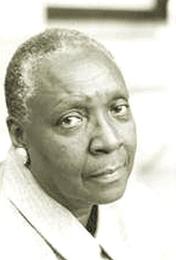 Maryse Condé, the Guadeloupean author of more than 20 novels, activist, academic and sole winner of the New Academy prize in literature, died April 2. She was 90. The Guardian reported that Condé, whose books include Segu and Hérémakhonon, "was regarded as a giant of the West Indies, writing frankly--as both a novelist and essayist--of colonialism, sexuality and the black diaspora, and introduced readers around the world to a wealth of African and Caribbean history."
Maryse Condé, the Guadeloupean author of more than 20 novels, activist, academic and sole winner of the New Academy prize in literature, died April 2. She was 90. The Guardian reported that Condé, whose books include Segu and Hérémakhonon, "was regarded as a giant of the West Indies, writing frankly--as both a novelist and essayist--of colonialism, sexuality and the black diaspora, and introduced readers around the world to a wealth of African and Caribbean history."
Writing of the "unputdownable and unforgettable" epic Segu, Booker winner Bernardine Evaristo praised Condé as "an extraordinary storyteller," while author Justin Torres wrote: "One is never on steady ground with Condé; she is not an ideologue, and hers is not the kind of liberal, safe, down-the-line morality that leaves the reader unimplicated."
Born Maryse Boucolon in Guadeloupe in 1934, Condé went to Paris at 16 for her education, but was expelled from school after two years: "When I came to study in France, I discovered people's prejudices," she recalled. "People believed I was inferior just because I was black. I had to prove to them I was gifted and to show to everybody that the color of my skin didn't matter--what matters is in your brain and in your heart."
Condé moved to the Ivory Coast in the late 1950s, spending the next decade in various African countries. "Unable to speak local languages and presumed to hold francophile sympathies, Condé struggled to find her place in Africa," the Guardian noted, adding: "She remained outspoken until she was accused of subversive activity in Ghana and deported to London, where she worked as a BBC producer for two years. She eventually returned to France and earned her MA and PhD in comparative literature at Paris-Sorbonne University in 1975."
Her debut novel, Hérémakhonon, was published in 1976, but she gained prominence as a contemporary Caribbean writer with her third novel, Segu (1984), which was a bestseller and praised as "the most significant novel about black Africa published in many a year" by the New York Times.
The next year she published a sequel, The Children of Segu, and was awarded a Fulbright scholarship to teach in the U.S. Over the coming decades, she became a prolific writer of children's books, plays and essays, including I, Tituba, Black Witch of Salem (1986); Tree of Life (1987); Crossing the Mangrove (1989); Windward Heights (1995); Desirada (1997); The Belle Créole (2001); The Story of the Cannibal Woman (2003); and Victorie: My Mother's Mother (2006).
After teaching in New York, Los Angeles and Berkeley, Condé retired in 2005. She wrote two memoirs: Tales from the Heart: True Stories from My Childhood (2001) and What Is Africa to Me? (2017). She was awarded France's Legion of Honor in 2004, and shortlisted for the Man Booker International prize, then a lifetime achievement award, in 2015. When she won the New Academy prize, a one-off award intended to replace the Nobel prize in literature when it was canceled in 2018, she described herself as "very happy and proud."
"But please allow me to share it with my family, my friends and above all the people of Guadeloupe, who will be thrilled and touched seeing me receive this prize," she said. "We are such a small country, only mentioned when there are hurricanes or earthquakes and things like that. Now we are so happy to be recognized for something else."
In her final years, she lived in the south of France. Her last novel, The Gospel According to the New World, was published in 2021, translated into English in 2023, and was shortlisted for the International Booker Prize.
Writing, she once observed, "has given me enormous joy. I would rather compare it to a compulsion, somewhat scary, whose cause I have never been able to unravel."

